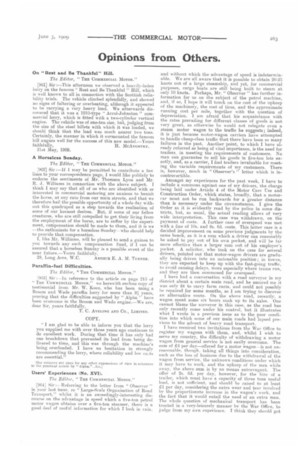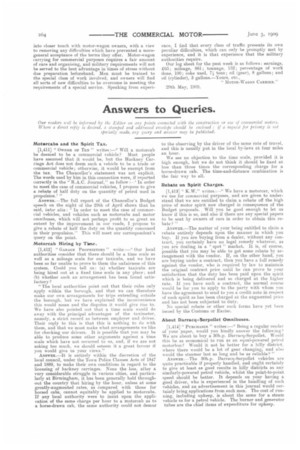Opinions from Others.
Page 15

Page 16

If you've noticed an error in this article please click here to report it so we can fix it.
On "Rest and Be Thankful" Hill.
The Editor, "T COMMERCIAL MOTOR."
[961] Sir :—This afternoon we observed a heavily-laden lorry on the famous " Rest and Be Thankful " Hill, which is well known to all in connection with the Scottish reliability trials. The vehicle climbed splendidly, and showed no signs of faltering or overheating, although it appeared to be carrying a very heavy load. We afterwards discovered that it was a 1910-type " Arrol-Johnston " commercial lorry, which is fitted with a two-cylinder vertical engine. The vehicle was of one-ton size, but, judging from the size of the steel billets with which it was loaded, we should think that the load was much nearer two tons. Certainly, the manner in which it surmounted the famous hill augurs well for the success of this new model.—Yours
faithfully, H. MCAUGHTRY. 21st May, 1909.
A Horseless Sunday.
The Editor, " THE COMMERCIAL MOTOR."
[962] Sir :—If I may be permitted to contribute a few lines to your correspondence page, I would like publicly to endorse the sentiments of Mr. Thomson Lyon and Mr. R. J. Williams in connection with the above subject. I think I may say that all of us who are identified with or interested in commercial motoring are anxious to banish the horse, at any rate from our main streets, and that we therefore hail the possible opportunity of a whole day without this quadruped as a step towards the realisation of some of our keenest desires. But, if some of our fellow creatures, who are still compelled to get their living from the employment of the horse, are to suffer by the experiment, compensation should be made to them, and it is we —the enthusiasts for a horseless Sunday—who should help to provide that compensation.
I, like Mr. Williams, will be pleased to send a guinea to you towards any such compensation fund, if I can be assured that a horseless Sunday is a possible event of the near future.—Yours faithfully,
28, Long Acre, W.C. ARTHUR E. A. M. TURNER.
Paraffinfuel Difficulties.
The Editor, "THE COMMERCIAL MOTOR."
[963] Sir reference to the article on page 215 of " TI-1E. CommintrraL MoToa," we herewith enclose copy of testimonial from Mr. W. Keen, who has been using a Broom and Wade paraffin lorry for more than 31years, proving that the difficulties suggested by " Alpha " have been overcome in the Broom and Wade engine.—We are, dear Sir, yours faithfully, T. C. AVELINO AND CO., LIMITED.
COPY.
" I am glad to he able to inform you that the lorry you supplied me with over three years ago continues to do excellent work. During that time it has only had one breakdown that prevented its load from being delivered to time, and this was through the machine's being overloaded. I have no hesitation in strongly recommending the lorry, where reliability and low eo...ts are essential."
Our columns are open for any othor expressions of view in reference to the practical article by " Alpha."_Eo.] Users' Experiences (No. XVI).
The Editor, THE COMMERCIAL MOTOR."
[964] Sir :—Referring to the letter from " Observer " in your last issue. re "Large-Scale Organisation of Road Transport," whilst it is an exceedingly-interesting discourse on the advantage in speed which a five-ton petrol motor wagon obtains over a five-ton steamer, there is a good deal of useful information for which I look in vain, and without which the advantage of speed is indeterminable. We are all aware that it is possible to obtain 20-25 knots out of a large steamship, and yet, for commercial purposes, cargo boats are still being built to steam at only 10 knots. Perhaps, Mr. " Observer " has further information for us on the subject of the petrol machine, and, if so, I hope it will touch on the cost of the upkeep of the machinery, the cost of tires, and the approximate running cost per mile, together with the question of depreciation. I am afraid that his acquaintance with the rates prevailing for different classes of goods is not very great, as otherwise he would not relegate even a steam motor wagon to the traffic he suggests; indeed, it is just because motor-wagon carriers have attempted to handle cheap-class traffic that there have been so many failures in the past. Another point, to which I have already referred as being of vital importance, is the need for trailers, in meeting the requirements of customers. No man can guarantee to sell his goods in five-ton lots exactly, and, as a carrier, I find trailers invaluable for meeting the variable requirements of my customers. There is, however, much in " Observer's " letter which is incontrovertible.
Amongst my experiences for the past week, I have to include a summons against one of my drivers, the charge being laid under Article 4 of the Motor Cars Use and Construction Order, which states, broadly, that a motorear must not be run backwards for a greater distance than is necessary under the circumstances. I give the Order as it is evidently read by the police in some districts, but, as usual, the actual reading allows of very wide interpretation. This case was withdrawn, on the payment of costs. A further case of overspeed was met with a fine of 10s. and 8s. 6d. costs. This latter case is a decided improvement on some previous judgments by the same bench, as it is a sum which a driver can reasonably be asked to pay out of his own pocket, and will be far more effective than a larger sum out of his employer's pocket. A solicitor, who took on the case for several drivers, pointed out that motor-wagon drivers are gradually being driven into an untenable position; in towns, they are expected to keep up with the fast-going traffic, to avoid causing delays, more especially where trams run, and they are then summoned for •overspeed.
I have had a conversation with a road surveyor in my district about a certain main road, and he assured me it was only fit to carry farm carts, and could not possibly be repaired for some months, so I am trying to discover an alternative route. On the above road, recently, a wagon spent some six hours sunk up to its axles. One cannot blame the surveyor in this case, as the road has only recently C01/10 under his control, but it illustrates what I wrote in a previous issue as to the poor condition into which some of our main roads had lapsed previous to the advent of heavy road transport.
I have received two invitations from the War Office to register my wagons with them, and, whilst I wish to serve my country, the difficulty of withdrawing a motor wagon from general service is not easily overcome. The sum of £4 per day—offered for a motor wagon—is not unreasonable. though. taking all things into consideration, such as the loss of business due to the withdrawal of the wagon from service, the unknown conditions under which it may have to work, and the upkeep of the men while away, the above sum is by no means extravagant. The offer of 2s. 6d. per day, however, for the hire of a trailer, which must have a capacity of three tons useful load, is not sufficient, and should be raised to at least £1 per day, considering the extra wear and tear involved by the proportionate increase in the wagon's work, and the fact that it would entail the need of an extra man. 'rhe whole question of mechanical transport has been treated in i very-leisurely manner by the War Office, to judge from my own experience. I think they should get into closer touch with motor-wagon owner; with a view to removing any difficulties which have prevented a moregeneral acceptance of the terms they offer. Motor-wagon carrying for commercial purposes requires a fair amount of care and organising, and military requirements will not be served to the best advantage in times of stress without due preparation beforehand. Men must be trained to the special class of work involved, and owners will find all sorts of new difficulties to be overcome in meeting the requirements of a special service. Speaking from experi
once, I find that every class of traffic presents its own peculiar difficulties, which can only be promptly met by experience, and it is that experience that the military authorities require. Our log sheet for the past week is as follows: earnings, £6.5; mileage, 881; tonnage, 152; percentage of work done, 100; coke used, 71, tons; oil (gear), 8 gallons; and oil (cylinder), 3 gallons.—Yours, etc.,
MOTOR-WAGON CARRIER.'




















